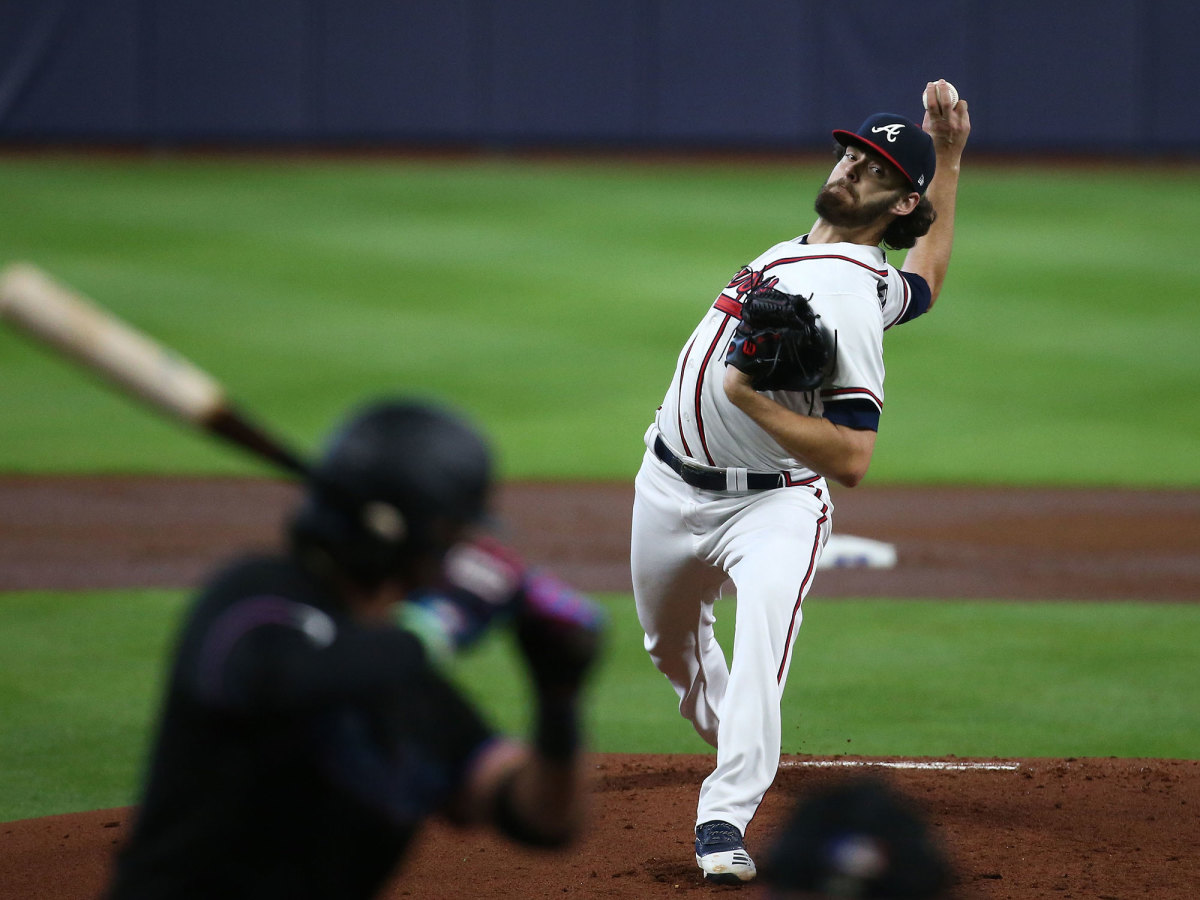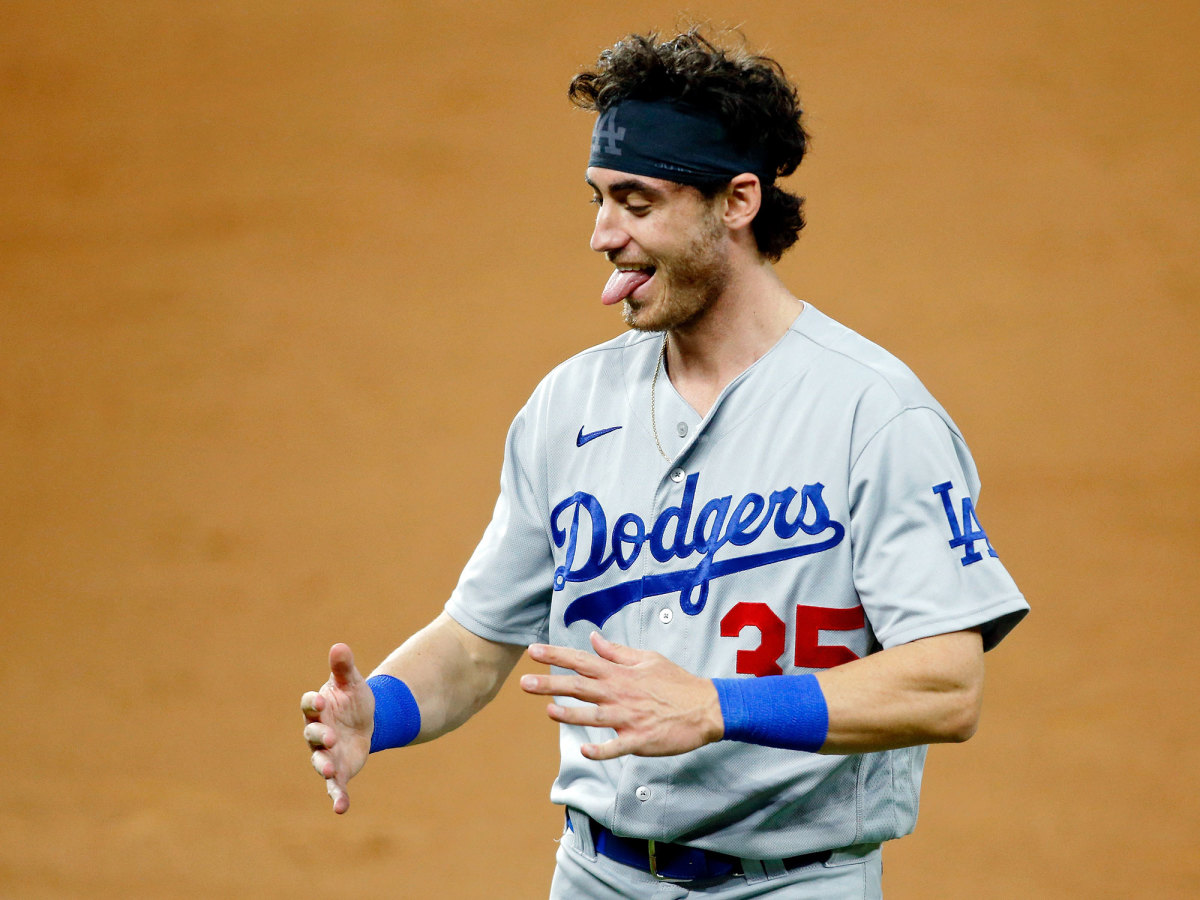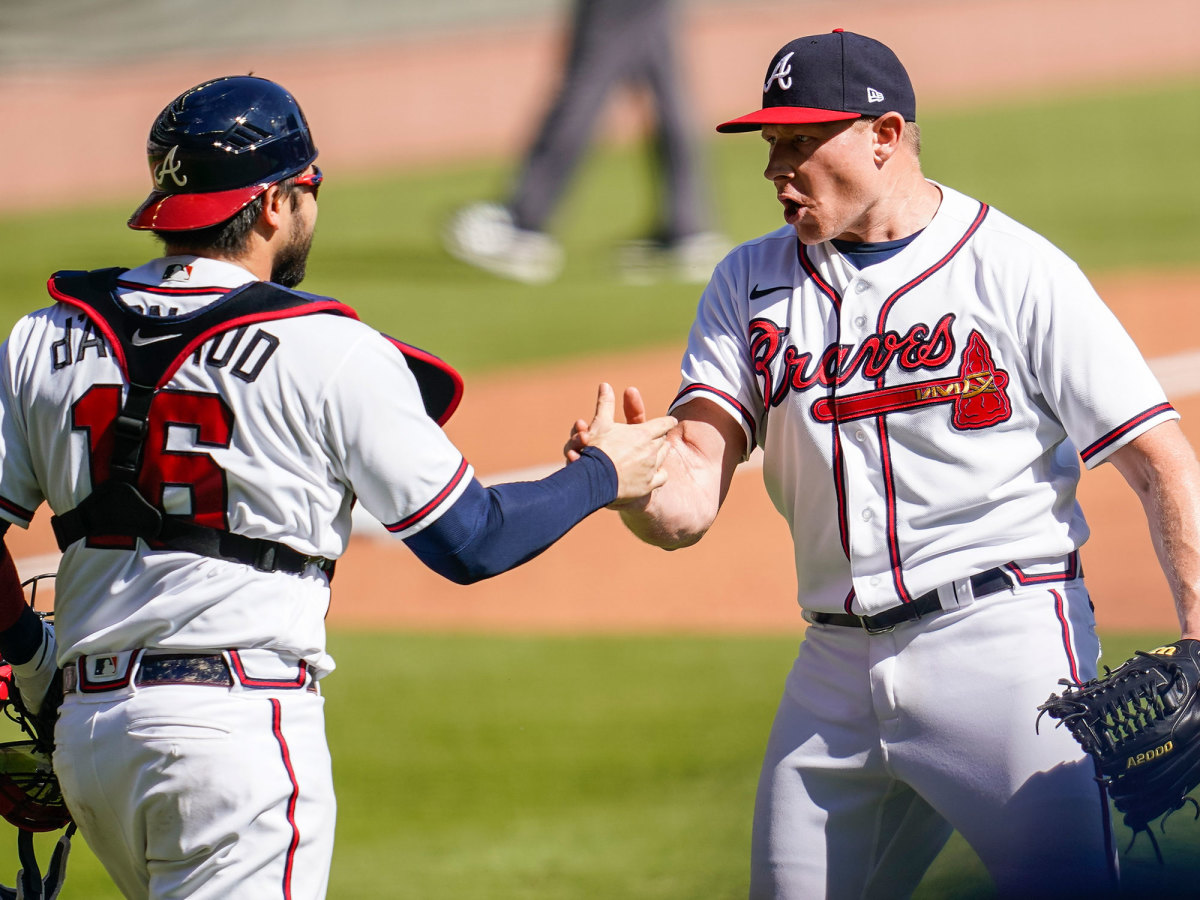What Will It Take for Braves to Upset Dodgers?
INSIDE THE ARLINGTON "BUBBLE" — The Los Angeles Dodgers are a juggernaut, at least as far as pandemic-shortened seasons go. They won the most games, scored the most runs, allowed the second-fewest runs and were second-best at turning batted balls into outs on defense. They flossed daily and never ran with scissors.
On paper, it is difficult to find an area to exploit on this team, other than if Kenley Jansen doesn’t restore the life on his cutter or the Dodgers’ game management gets a little too cute with the plethora of options they hold. They should advance to their third World Series in four years—on paper.
Their opponent, Atlanta, does have a path toward stealing the National League Championship Series right out from under them, and the Braves know it. This team is rolling, even if its 5–0 playoff run was built on squelching the worst-hitting team in baseball (Cincinnati) and the sixth-worst slugging team (Miami).
Watching the Braves work out this weekend at Globe Life Field was to find a loose, relaxed and confident ballclub. Freddie Freeman is the rock of it but Marcell Ozuna, with his humor and big-brother type friendship and mentorship of Ronald Acuña Jr., makes it roll. The Braves play loud, especially with their bats. Right now Atlanta acts like it can beat anybody, even this year’s juggernaut.
The two highest-scoring teams are matched up in a pitcher’s ballpark with up to seven straight games without a day off. That’s a recipe for fun, and maybe a few surprises. Here are some of the keys that can tilt the series:

Max Fried and Ian Anderson
To win the series the Braves likely need three wins from their starts. Too much has been made of the Atlanta rotation being the worst among all playoff teams in history (5.51 ERA). Fried, Anderson and Kyle Wright were 12–6 with a 3.06 ERA. Eleven other guys, most of whom will not see the field, were 2–10, 7.95.
Thanks to the addition of Mookie Betts, the Dodgers are not as vulnerable to left-handed pitching as in past years, but they still are a little worse against left than right. When he’s right, Fried doesn’t allow home runs and changes speeds to keep hitters out of hitters’ counts. One warning sign: His curveball has lost spin every month this year. Against Miami in the NLDS it was down 266 rpm from when the season began. It didn’t have the same bite and he could not land it when he wanted.
Anderson is a handful, especially for teams trying to solve him while seeing him for the first time. He is the 2013 Michael Wacha of the postseason with a wicked four-seam fastball/four-seam change combination out of a true overhand arm slot—only with a better curveball than Wacha had.
Batters are hitting .079 against Anderson’s changeup. He has thrown 234 of them and given up five hits—three singles and two doubles.
Globe Life Field
The Dodgers have played six games here, the Braves none, giving Los Angeles an edge. The place is so massive it likely will have to bring the fences in over the next couple of years.
At Globe Life Park last year, one out of every 4.8 fly balls was a home run. Here at Globe Life Field it’s one every 9.4—which is to say it’s almost twice as hard to hit it out.
Outfield defense and baserunning come more into play.
And the minute you think somebody should put a bunt down to squeeze out a run, please place a cold compress on your head and lie down. The next sacrifice bunt this postseason will be the first. Thirty-three games. No bunts. And yet people keep talking about them like it’s 1968.
The Leading Men
Betts (.589) and Acuña (.568) rank 1–2 in slugging by leadoff hitters over the past three years. If you’re looking for a player to change a game or the series, don’t overlook the obvious: the two guys who come to bat the most and the two guys who have more ways to influence a game than anybody else on the field (hitting, baserunning, defense).

First Pitches
Another category in which the Dodgers led the world was first-pitch strikes (63%). The Braves led the majors in doubles, homers, RBIs and slugging on first pitches.
This is one of the more fascinating subplots because neither will back down from their strengths. The Dodgers don’t just throw get-me-over pitches, either. The Padres have a hitting profile much like the aggressive Braves, but in the NLDS they hit .111 on first pitches from the Dodgers, who poured in 60% strikes and 72% fastballs on them.
Fastballs
I’ve been telling you the Braves devour fastballs. Freakish stat: Freeman hit .500 and slugged .933 against fastballs 95 mph and faster. That’s ridiculous.
The Dodgers’ pitchers love velocity. Of the 16 playoff teams, only the Marlins have a higher average pitch velocity than Los Angeles.
You’ll get a quick idea of where we are headed in this classic power vs. power matchup. Dodgers Game 1 starter Walker Buehler allowed the lowest slugging percentage on fastballs (.276).
No Days Off
The middle games in the series will be fun. More runs and more decisions. Atlanta manager Brian Snitker is going to have to go with at least one bullpen game. Dodgers manager Dave Roberts is going to have to trust Dustin May more and find a role for Tony Gonsolin. (It may be a Game 4 start for Gonsolin. He threw a bullpen session Saturday night in his full road uniform.)
Said one coach in the series, “There’s going to be a game or maybe two when you won’t be able to go to your big [relief] guys. These guys all say they’ll take the ball, but you have to save them from themselves sometimes. I wish there was one off day in there.”
Joe Kelly vs. Freddie Freeman
Any time you play the Braves you better have somebody lined up to face Freeman, one of the game’s best fastball hitters, which makes him a tough out late in games when bullpen velocity rules. You can book it now: more than once the Dodgers will need to get Freeman out in a late and close situation.
Who does Robert trust? Probably not Kenley Jansen. Freeman is 3-for-6 with a walk vs. Jansen. He could go to Adam Kolarek, the lefty specialist, but the sample size is small (0-for-3) and Kolarek is coming off a rough outing vs. the Padres.
The answer may be Kelly. Freeman is 1-for-8 with three walks vs. Kelly, but the choice fits also because Kelly’s curveball is a better weapon than anybody else’s fastball. Kelly has thrown 87% curveballs to left-handed hitters this year, including 23 of his last 24 pitches to left-handed batters.

The Atlanta bullpen
It’s very underrated. It has allowed one run this postseason. Snitker’s options are loaded with veterans with lots of big-game, late-inning experience (Mark Melancon, Will Smith, Darren O’Day, A.J. Minter, Chris Martin, etc.) and the guy who has the hottest hand (Tyler Matzek) was living in a borrowed RV in Grand Prairie, Texas, two years ago pitching for the independent Texas AirHogs, one of only 10 players there who was not part of the Chinese National Team. All but O’Day are true platoon-neutral options for Snitker.
Kenley Jansen’s cutter
As a closer, Jansen’s slow delivery to the plate always has been a liability. Since May of 2016, base stealers are 43-for-43 against Jansen, including the postseason. Giving a free 90 feet can be huge in a one-run game.
But lately the bigger issue has been his cutter and lack of life on it. In his last outing, against San Diego, Jansen averaged 89.1 on his cutter, the lowest average velocity in his 440 career outings in which he threw more than 10 cutters.
Through Sept. 19 Jansen averaged 91.1 on his cutter and held opponents to a .225 batting average against it. Since then it has dropped to 89.2 and hitters are batting .286 against it.
Jansen is a gamer and a respected, strong voice in the Dodgers’ clubhouse. In their perfect world, it is Jansen who gets the last out that returns Los Angeles to the World Series. Roberts will not be guided by sentiment. And those high-flying, fun-loving Braves, if they continue to hit fastballs and their deep bullpen stays hot for another week, may just write a different ending altogether.
